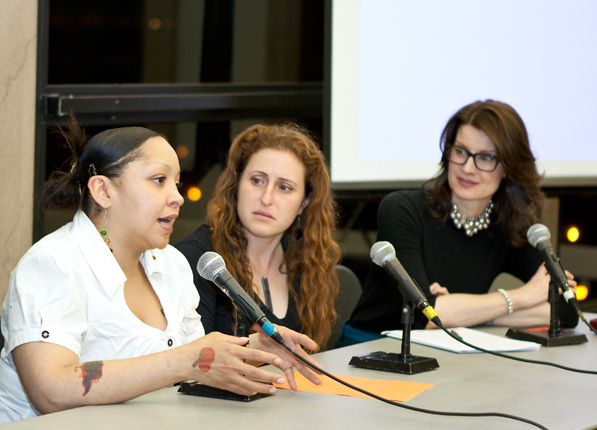Surviving the sex trade: Patricia’s story
By Robin Amer

Surviving the sex trade: Patricia’s story
By Robin Amer
Rachel Durchslag wants to challenge the image you may have of the glamorous lady of the night who has chosen sex work for its lifestyle perks. Choice, she says, rarely enters into the equation.
The executive director of the Chicago Alliance Against Sexual Exploitation estimates that between 16,000 and 24,000 women and girls are involved in “prostitution related activities” in and around Chicago right now. The average age at which these women – girls, really – entered prostitution is 12 to 14. A 2006 study conducted by the mayor’s office reported that 100 percent of the girls and women surveyed had experienced “some kind of violence” in the sex trade, including being “raped, kicked, threatened with a weapon, punched or slapped.” Pimps often prey on vulnerable girls who may be experiencing violence or abuse at home, exploiting their desperation and luring them into sex work.
“What 12-year-old, when given other options,” Durchslag asks, “would choose this kind of life?”
We don’t know how many of Chicago’s sex workers have been trafficked into the trade, because of how much of it happens in secret, Durchslag said. It’s hard to get accurate numbers. Under federal law any girl under the age of 18 is considered to have been trafficked. This spring the Illinois House and Senate reworked existing criminal law to expand the state’s definition of sex trafficking to include coercion – along with force and fraud – as ways women end up as sex workers. Gov. Quinn is expected to sign the bill into law.
At a recent talk sponsored by the Neighborhood Writing Alliance, Durchslag introduced the audience to the kind of person she’s hoping the new law will protect: 30-year-old Patricia, who used only her first name. Patricia grew up on Chicago’s South Side; her mother was a prostitute and her father was a pimp. “He tried to buy me from her when I was of age,” Patricia told the audience. “So she tried to run.” But Patricia was later molested by her mother’s boyfriend. When Patricia alerted her mother to the abuse, her mother accused her “of ‘trying to take her man from her’ so she put me out,” Patricia said. “She chose him over me.” Patricia was just 12 years old.
Patricia described how being abandoned left her without choices or protection, so she turned to what organizers call “survival sex.” That led to nearly two decades of sex work, sometimes by choice but often very much against her will.
In the audio above, Patricia shares her troubling story and explains why, after 18 years in prostitution, she “can’t see laying down again.” In addition to working with CAASE, Patricia recently got her first job outside of prostitution, working in the food service industry.
(A heads up to listeners: Patricia’s story is very intense and sometimes graphic.)
Dynamic Range showcases hidden gems unearthed from Chicago Amplified’s vast archive of public events and appears on weekends. Rachel Durchslag and Patricia spoke at an event presented by the Neighborhood Writing Alliance in April. Click here to hear the event in its entirety.